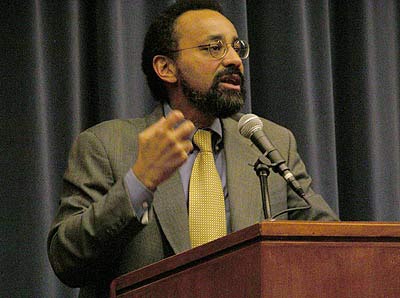 Christopher Edley Jr. will remain as faculty at the University of California, Berkeley law school where he has been dean since 2004.
Christopher Edley Jr. will remain as faculty at the University of California, Berkeley law school where he has been dean since 2004.
Edley will remain as faculty at the law school where he has been dean since 2004. His medical leave of absence began this week, and he has scaled back his deanship to officially end in December. Originally, his term was supposed to expire next year.
In a letter to law school faculty and staff, Edley described his health as “more than worrisome, but much less than dire.”
He went on to explain, “As some of you know, I had surgery for prostate cancer in May but need further treatment. This must be my priority. I expect (doctors) will vanquish the malady within a few months (but) I am not prepared to return to the deanship. These developments have reminded me again how short life can be, and for that reason, I feel an urgency to turn to other professional goals I will pursue while continuing with you as a faculty colleague. Chief among these will be public education equity and excellence.”
The latter were never far from Edley’s mind during his nine-year term as dean of the Berkeley law school, which last year enrolled a first-year class of 270 students of whom 40 percent were minorities and 51 percent were women across all racial groups. Under Edley, the law school has grown its faculty by 40 percent and consequently lowered its student-faculty ratio from 18-to-1 to 12-to-1.
A prolific fundraiser, he has expanded fellowships and loan forgiveness so that now, the law school returns about 24 percent of tuition dollars in the form of aid to students. The school is closing in on its $125 million goal in a fundraising campaign that aims to support more scholarships, classroom and library space and academic programs.
Edley’s commitment to diversity and inclusion has gone well beyond race and gender. For instance, law professor John Yoo, who joined the Berkeley faculty in 1993, drew wide, public condemnation for authoring controversial memos while serving as deputy assistant U.S. attorney general during President George W. Bush’s administration. The memos authorized the use of enhanced interrogation techniques such as waterboarding—usually regarded as torture—during Bush’s war on terror. Although some outraged Berkeley law school constituents demanded Yoo’s dismissal from the faculty, Edley has refused, saying Yoo’s ideology didn’t merit such action.
UC-Davis law dean Kevin Johnson, who with Edley are among the few deans of color at traditionally White law schools, praised him for “taking Berkeley law school to new heights. His zest and enthusiasm for intellectual life in the stratosphere is contagious and I look forward to seeing Chris’ return to the full-time world of public intellectuals.”
Since 2009, Edley has concurrently served as a senior policy adviser to University of California President Mark Yudof, although many of the high-profile matters Edley examined didn’t involve his campus. For example, he advised on campus policing of demonstrations after a video went viral of UC-Davis police pepper-spraying students in their faces during a nonviolent protest. He also tackled campus climate and racial hostilities after UC-San Diego was rocked by a party mocking Black History Month and other incidents offending Black students and faculty.
Outside of academia over the years, Edley has served in two White House administrations, holding policy and budget positions under President Carter and later, under President Clinton.
Before become dean at Berkeley, Edley spent more than two decades as a Harvard Law School professor. He and Harvard University professor Gary Orfield founded the Civil Rights Project in the aftermath of a 1996 court ruling that squelched race-conscious admission policies at many universities. The case stemmed from a reverse affirmative action lawsuit filed by White student Cheryl Hopwood, who was denied admission to the University of Texas law school. The Fifth U.S. Circuit Court of Appeals ruled against the UT practices.
Nevertheless, the Civil Rights Project at Harvard provided research to policymakers focused on racial and ethnic inequities. By 2003, multiple friend-of-the-court briefs in a U.S. Supreme Court case involving the University of Michigan cited CRP research showing the impact and benefits of racial diversity in higher education. Ultimately, the Supreme Court justices cited CRP in the majority opinion that upheld the university’s use of affirmative action in admissions.
This week, Orfield, who now teaches at UCLA where the CRP is now housed under a revised name, called Edley a “powerful partner” in launching the CRP.
“With an intellect second to none, great understanding of both law and politics, many friends and admirers in powerful positions and an ability to visualize and accomplish things that others would never try, he will be a great asset to the lagging struggle for educational equity when he recovers (from cancer),” Orfield said, adding, “He is one of a kind. We need him.”
Edley and Orfield were among the 2012 winners of the Dr. John Hope Franklin award, an annual recognition for excellence in higher education sponsored by Diverse: Issues in Higher Education.
Berkeley law professor Gillian Lester, who most recently was associate dean, will serve as acting dean in Edley’s absence. A search for a new dean will begin soon.





















